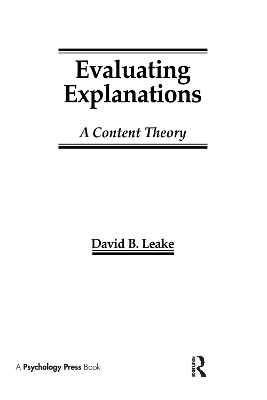
Evaluating Explanations
A Content Theory
Seiten
1992
Psychology Press (Verlag)
978-0-8058-1064-6 (ISBN)
Psychology Press (Verlag)
978-0-8058-1064-6 (ISBN)
Psychology and philosophy have long studied the nature and role of explanation. More recently, artificial intelligence research has developed promising theories of how explanation facilitates learning and generalization. By using explanations to guide learning, explanation-based methods allow reliable learning of new concepts in complex situations, often from observing a single example.
The author of this volume, however, argues that explanation-based learning research has neglected key issues in explanation construction and evaluation. By examining the issues in the context of a story understanding system that explains novel events in news stories, the author shows that the standard assumptions do not apply to complex real-world domains. An alternative theory is presented, one that demonstrates that context -- involving both explainer beliefs and goals -- is crucial in deciding an explanation's goodness and that a theory of the possible contexts can be used to determine which explanations are appropriate. This important view is demonstrated with examples of the performance of ACCEPTER, a computer system for story understanding, anomaly detection, and explanation evaluation.
The author of this volume, however, argues that explanation-based learning research has neglected key issues in explanation construction and evaluation. By examining the issues in the context of a story understanding system that explains novel events in news stories, the author shows that the standard assumptions do not apply to complex real-world domains. An alternative theory is presented, one that demonstrates that context -- involving both explainer beliefs and goals -- is crucial in deciding an explanation's goodness and that a theory of the possible contexts can be used to determine which explanations are appropriate. This important view is demonstrated with examples of the performance of ACCEPTER, a computer system for story understanding, anomaly detection, and explanation evaluation.
Authored by Leake, David B.
Contents: Explanation and Understanding. Perspective on the Theory. Anomalies and Routine Understanding. Pattern-Based Anomaly Detection. Anomaly Characterization. A Vocabulary for Anomalies. Nonmotivational Anomaly Types. Evaluating Relevance and Plausibility. Focusing on Important Factors. Conclusions and Future Directions.
| Erscheint lt. Verlag | 13.5.1992 |
|---|---|
| Reihe/Serie | Artificial Intelligence Series |
| Verlagsort | Philadelphia |
| Sprache | englisch |
| Maße | 152 x 229 mm |
| Gewicht | 498 g |
| Themenwelt | Geisteswissenschaften ► Psychologie ► Allgemeine Psychologie |
| Geisteswissenschaften ► Psychologie ► Verhaltenstherapie | |
| Informatik ► Theorie / Studium ► Künstliche Intelligenz / Robotik | |
| ISBN-10 | 0-8058-1064-1 / 0805810641 |
| ISBN-13 | 978-0-8058-1064-6 / 9780805810646 |
| Zustand | Neuware |
| Informationen gemäß Produktsicherheitsverordnung (GPSR) | |
| Haben Sie eine Frage zum Produkt? |
Mehr entdecken
aus dem Bereich
aus dem Bereich
Buch | Softcover (2024)
REDLINE (Verlag)
20,00 €
Eine kurze Geschichte der Informationsnetzwerke von der Steinzeit bis …
Buch | Hardcover (2024)
Penguin (Verlag)
28,00 €
was sie kann & was uns erwartet
Buch | Softcover (2023)
C.H.Beck (Verlag)
18,00 €


